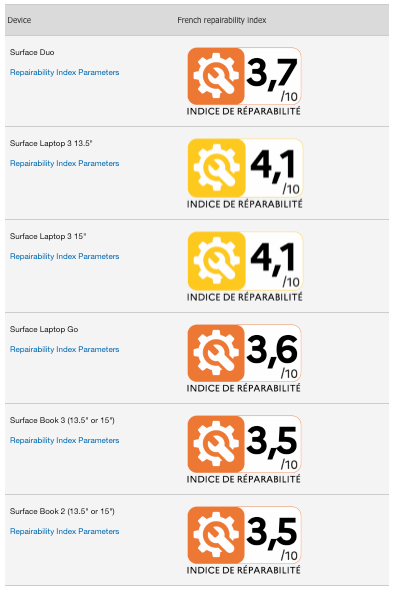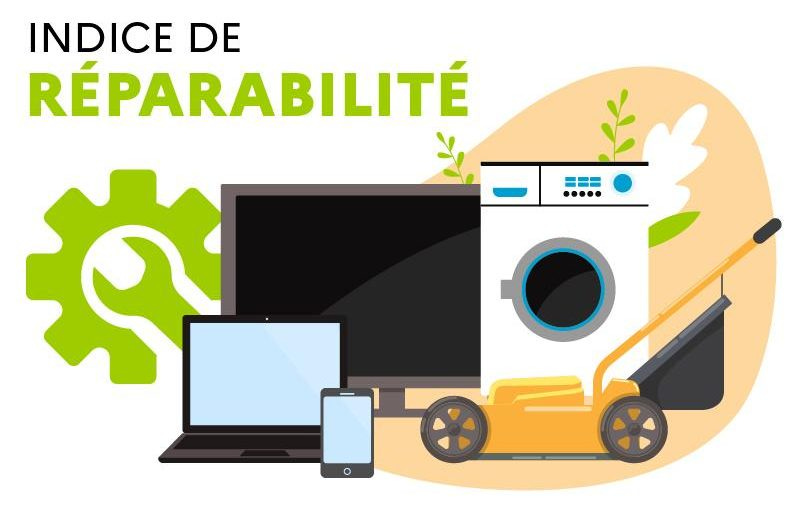D-Students: Microsoft, Apple Get Failing Grades on France’s Repair Index. (For Now.)
France became the first country to rate products based on their repair-ability, much to the chagrin of Apple and Microsoft, whose products received failing grades.
There’s a lot of evidence that rating and scoring systems of various sorts can have a big impact shaping consumer behavior. In the U.S., good scores on the National Highway Traffic Safety Administration’s “five star” safety rating system for vehicles is something that car companies crow about in television, radio and print ads for vehicles. This, despite the fact that Detroit spent decades and millions of dollars fighting federal laws mandating seatbelts, airbags and other safety features. And it’s not like car makers suddenly developed a conscience. It’s just that consumers embraced the idea of vehicle safety being an important feature and now look to the score in making decisions about which car to buy.
First Mover Advantage to France
That’s why the new Repairability Index introduced by the Institut du Commerce in France is such a big deal. The new index, which went into effect on January 1st, rates a range of devices based on a range of criteria affecting repair-ability. They include: front-loading washing machines (excluding washer-dryers), televisions, smartphones, laptops and electric lawnmowers.
Yes, that’s a somewhat odd assortment of devices, but the Institut du Commerce intends to extend the ratings to other categories of electrical and electronic products.
The rating system is comprised of weighted rankings on a number of criteria:
Documentation: does the manufacturer make technical documents available free of charge to repairers and consumers?
Disassembly and access to tools: how easy is the product to disassemble? Does the manufacturer use specialized screws and fasteners that make it harder to service the device?
Availability of spare parts: does the manufacturer make spare parts available and for how long after the device was manufactured?
Price of spare parts: how much the manufacturer charges for spare parts. The score is determined by the ratio between the selling price of spare parts and the price of the product.
There are also criteria specific to the product category concerned.
D-Students
The idea of a repairability index isn’t new. (iFixit has offered one for years). And it isn’t perfect. However, even though it only went into effect in January, the ratings system is already changing the conversation around repairability. First of all by highlighting the poor ratings that prominent consumer electronics received.
Apple, for example, published scores for its MacBook laptops and iPhones on its French language support site in accordance with the law. How did they do? Not well. Scores on the iPhone ranked from a low of 4.5 out of 10 (for the iPhone 11 Pro Max) to a high of 6.7 out of 10 for the long-in-the-tooth iPhone 7. By comparison, the repair-friendly Fairphone rated an 8.7 out of 10 on the same index.

For Macbooks, the scores range from 5.6 for a 2020 MacBook Pro 13 inch to a score of 7.0 for a cira 2017 MacBook Air 13 inch. (It’s interesting to note that, in both cases, Apple products have become less repairable over time, not more.)
Those aren’t great grades, but Microsoft manages to do even worse. Scores on Microsoft Surface laptops range from a low of 3.5 for the Surface Book 2 to a high of 4.1 for the Surface Laptop 3.
Black Eyes As A Strategy
Those kind of scores are an embarrassment for companies, like Apple, that pride themselves on product quality. And that’s kind of the point: by framing “quality” around a concept like service- and repairability, French regulators have accomplished something nobody else has to date. Namely: they’ve managed to align the interests and reputations of large device makers with the interests of people who want more sustainable, repairable products.
There is already evidence that the ratings system is having the desired effect. Kyle Wiens of iFixit notes that Samsung published service manuals for its products in French as a way to bump their repair-ability scores. He said iFixit is consulting with “prominent device makers” on ways to improve their repairability scores, as well.
France showed that it is “not impossible or utopian to rate products based on repairability,” said Ugo Vallauri (@ugomatic), the co-founder of The Restart Project.
Room for improvement
Still, there’s plenty of room for improvement. “France was ahead of the game,” Vallauri notes. But as with any first-mover, their rating system isn’t perfect. For one, he notes, the French system leaves it to manufacturers to determine their rating based on the established criteria. That means that companies can easily score themselves generously and leave it to others to notice.
The multi-part, weighted rating system also allows device makers to assemble respectable scores without checking off what most repair advocates would consider “must haves.” For example, Vallauri notes that it is possible for a device to assemble a score of 6 out of 10 with “zero commitment to providing spare parts.”
A Call for Referees
The emergence of the French Repairability Index has also underscored a bigger problem: a lack of groups and individuals capable of holding corporations accountable.
As it stands, civil society and other organizations simply do not have the resources to police every repairability score on every electronic device, Vallauri notes. That means that manufacturers are free to cheat or game the rating system with little fear of being called out. Without governments stepping in to do that - or renewed investment in civil society organizations that can - the French repairability index or others like it could become little more than window dressing.
Still, Vallauri is hopeful that the French index will serve as an early example of a more toothy EU-wide repairability index. “These are teething problems,” he said. “They reveal some improvements that need to be made.”
“France has shifted the conversation from whether (a ratings system) is possible to how to make it better. That in itself is an achievement that other countries could try to adopt or - as we hope - an EU wide index could come into place.”






i am technicien electronique,informatique,electromenager.
I help everyone who needs me